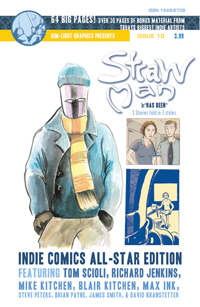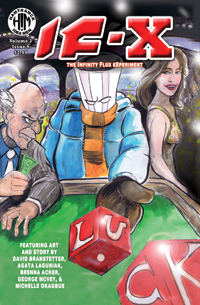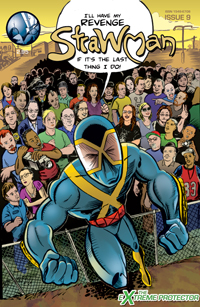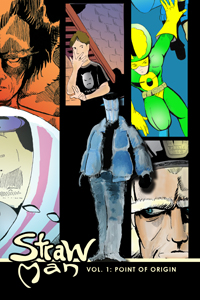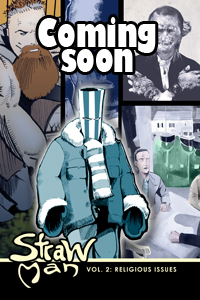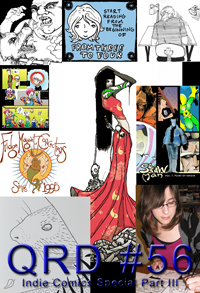
July 2012
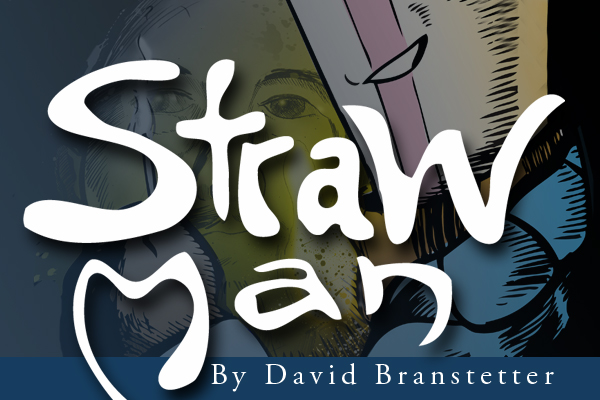
City: Evansville, IN
Comics: Straw Man
Websites: www.strawmancomics.com
QRD – How old were you when you first got into comics & did you always stick with them or did you come back to them?
David – I can still remember reading this Superman comic in the car. It was this pretty awesome cover where a crowd of people were dragging Superman down the street. It took something like 30 minutes to read. There was a lot of history going on so it was kinda hard to follow, but I felt like it was pretty awesome overall. I think I was 6 or 7 then. I bought a few random issues until I got my hands on #344 of The Amazing Spider-Man. I was ten then & it pretty much sealed the deal. I stopped reading comics when I was 15 because they were sort of banned in the house. So it wasn’t until I started doing research for my own comic book that I really became a reader again.
QRD – What was the first comic book you ever bought?
David – The Adventures of Superman #436.
QRD – How old were you when you put out your first comic?
David – 6
QRD – What decade do you think produced the best comics?
David – The 80s had some awesome stuff. Call me biased. Sure the 60s had the creation of the most popular books, but the 80s had really nailed everything. There was so much groundbreaking storytelling & techniques going on.
QRD – Why comics instead of just writing or drawing?
David – Drawing is “rendering” to me. I’m not such a fan of laborious rendering. I’m more of a fan of storytelling, cartooning, & experimentation. I feel like anyone can “render”, so I’ve tried to approach things from a more expressionistic point of view. I mean, how am I supposed to stand out if I do what everyone else is doing? On the writing side of things, I’ve never really given myself enough credit in that area. Again I feel like anyone can put words together to form some kind of coherent story. Then there’s the medium itself. Comics are awesome.
QRD – Do you see mini-comics & indie comics as paths to mainstream comics or as their own unique media?
David – I think of it more like this: I have a story to tell & I have to find a way to tell it. I think when it’s done I’ll have a substantial work that could be a valuable intellectual property. I’m not saying that I want to do it for “money”, but the idea of creating a self-sustained model that will allow me do what I love is very important to me. Mainstream doesn’t really motivate me, being appreciated does. There’s no way I’ll ever be accepted into the mainstream comics world. I don’t draw like Jim Lee. Indie comics are in a way a weird subculture of comics. They can do things that mainstream comics will never even dream of doing.
QRD – How many copies of your comic do you print in your first run?
David – I printed 100 copies of Straw Man 1-8, & only 50 of issue 4. I decided to go big & print 2000 copies of issues 9 & 10. I hope to do the same with issues 11 & 12.
QRD – How much do you think comics should cost?
David – A dollar.
QRD – How many books do you produce a year & how many would you like to?
David – One. That’s the sad truth. But I’m learning to get more productive. I think doing it quarterly would be ideal & sustainable.
QRD – Do you think stories should be serialized or delivered as complete works?
David – I think the story should feel complete, whether it’s a single issue or a trade. I’ve read some things that are like 5 pages long & it’ll say “to be continued”. That sort of thing really feels like a waste of time. Chances are the follow up won’t be produced & I’ll never read it. So why give the reader just part of a story? That doesn’t make any sense.
QRD – How are comic strips different than comic books & which medium do you prefer?
David – Definitely comic books. Not to say amazing things can’t be done with comic strips. I read Funky Winkerbean’s “Lisa’s Story” as a collected work & it really worked. Essentially with comic strips you have to remind the reader of what they read last time & slowly move the story forward. Conversations will feel forced, but they help remind the reader of what happened before. It’s a difficult form to master.
QRD – How long is it from when you start a comic until it’s printed?
David – On average a year.
QRD – What do you do better with your comics now than when you first started?
David – Just about everything, from production to drawing to storytelling.
QRD – At what point in the artistic process do you work digitally?
David – Lettering, toning, cleaning up artwork, layout, & design.
QRD – What do you think of digital comics & webcomics?
David – It’s a means to an end. I like webcomics because they’re a great promotional tool for real comics. Digital comics aren’t comic BOOKs. They’re PDFs. There’s something nice about holding a comic book.
QRD – Do you prefer working in color or black & white?
David – I work in black & white because it’s cheaper. I love the old school 4-color process. I don’t like modern coloring techniques. What I mean by that is the super rendered super saturated high-end glossy stuff. There are some great things that can be done with flat colors that can give a nice lithographic feel. I’m beginning to realize the importance paper stock can play on the perceived quality of a book. I’m never satisfied with the color work that I do, so it’s often something I struggle with. I have found if I work with 25% increment scale in CMYK that it tends to work better.
QRD – How many different people should work on a comic & what should their jobs be?
David – I’m not above working with great talent. But unless both parties are in 100% the results are not going be as unified as an artist’s singular vision.
QRD – How do you find collaborators?
David – I’m always asking people to contribute to Straw Man in the form of back-up material. Frankly it’s the way I would like to be treated. I try to surround myself with people who are really pushing themselves to be great. Most people don’t even take me up on my offer. It’s frustrating because they’ll be pretty talented, but they don’t want to put themselves out there until they feel like their work is at pro quality.
QRD – How tight do you think a script should be as far as telling the artist what to draw?
David – I try to leave room for new ideas. My scripts are never finalized until they go to print. I just finished a short story & there was a section that had this really great line of dialogue. When it came time to edit, I literally couldn’t fit the dialogue into the panel. So I had to really compress the writing so that it would work in the space. By using less words I think it ended up being more effective. I haven’t worked from anyone else’s script before, but I think it would be nice to be as descriptive as you can be in that realm. After all as a penciller, you’re just serving the vision of the writer. If he doesn’t communicate that vision, the penciller will not do his story justice.
QRD – What comic book person would you be most flattered to be compared to?
David – My heroes are Dave Sim & Erik Larsen. Someone once told me that one of my short stories reminded them of Harvey Pekar but with more heart. That was one the best compliments I’ve received.
QRD – What do your friends & family think of your comics?
David – eh.
QRD – What do you think of superheroes?
David – They’re great & fun as long as they’re focused on story first.
QRD – Marvel or DC?
David – I’m gonna have to go with Marvel on this one, but you should change the question to Marvel, DC, or Independent. I don’t buy any DC or Marvel books any more & haven’t done so since Captain America Hail Hydra #2 (By Indie Superstar Tom Scioli).
QRD – What comic characters other than your own would you like to work with?
David – Honestly? No one really. I like drawing Cerebus, but who could live up to that?
QRD – Ideally would you self-publish?
David – Ideally, I would be doing more of the behind the scenes stuff than actually drawing. I was the only artist I could afford on my budget. I think I have an eye for design & talent. I wouldn’t mind overseeing about three or four books & really hawking them.
QRD – What conventions do you try to attend & why?
David – S.P.A.C.E. is my usual destination. It’s the first convention I attended & I feel a certain affinity to Columbus. Until I have an actual product in my hand (like the finished Straw Man) there’s no sense in loosing money if it doesn’t lead to a certain amount of intensity.
QRD – What do you do to promote your books?
David – I very politely ask people to buy them. Ideally I’d being doing a lot of things, but there just isn’t the time. I am working on an exchange program for Indie artists to help each other to promote their book. I am interested in doing a web comic to help build an online presence. So... one thing at a time.
QRD – Do you think your comics are well suited to comic shops or would sell better elsewhere?
David – I don’t know. I think my comic is for that guy who looks through 20 boxes of records to find that one obscure gem. He’ll be happy when he finds it.
QRD – What other medium would you like to see some of your comics made into (television, film, games, action figures, etc.)?
David – I’d love to see Wes Anderson take a crack at Straw Man. My brother made me a pretty awesome Straw Man USB drive. It was cute. I think it would sell more copies than my comic if it was mass produced.…
QRD – Do you consider yourself a comic collector or a comic reader or both?
David – I like to read a good story. I like to read the whole story. So I have to collect the books to read the story. Do I want anything “valuable”? No.
QRD – What do you see as the most viable mediums for comics distribution 10 years from now?
David – Peer-to-peer promotion.
QRD – What would you like to see more people doing with comics?
David – Selling to “non-comic” fans. Indie comics are very strange specified genre. We’re our best fans & we’re mostly selling to ourselves. I wish there was a way of legitimizing our work to the mainstream audience.
QRD – Anything else?
David – I really think it’s the responsibility of the indie comics community to find a way to reach out to the more mainstream audience. I’ve noticed a trend that bigger areas seem to have a concentration of really talented artists producing work. If there was some way that talent could be put to use that directly involves the community in some way, it would produce work with great local appeal. I do think that as we consume less & produce less we’ll need to be entertained more. I think this will lead to greater demand for the indie artist.







